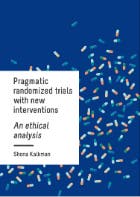Shona Kalkman
Pragmatic randomized trials with new interventions: An ethical analysis

- Datum
- (Co) promotoren
- 02-03-2017
- prof.dr. J.J.M. van Delden, prof.dr. D.E. Grobbee, dr. G.J.M.W. van Thiel
Samenvatting
Randomized controlled clinical trials (RCTs) are considered fundamental to the optimization of health care decision-making. Today, the drug development and evaluation process is dominated by so-called explanatory RCTs. Such RCTs are carried out in highly-controlled conditions to deliver the best evidence supporting market authorization of new pharmaceutical interventions. However, patients in explanatory phase III trials are very different from the actual patients who visit health care facilities in the context of “real world” clinical care. In the real world patients tend to be older, sicker and less keen on taking their medication. And what they care about is not necessarily bone density and systolic blood pressure, but rather whether the new drug keeps them out of the hospital. The focus on ‘ideal’ patients and situations means that for many patients it is uncertain whether a new drug on the market works better in real life than any of the other alternatives available. The misalignment between efficacy data (can the drug work?) and effectiveness data (does the drug work in real life) suggests that explanatory RCTs cannot do all the work. The collection of so-called “real world data” has been proposed to complement the evidence-base for making health care decisions. Pragmatic randomized trials are considered one of the strategies to obtain real world evidence. They contrast explanatory RCTs by question and design, since they aim to answer questions about the effectiveness of health interventions in routine care conditions. Recent calls have even gone out to design such trials already at the time of regulatory market approval of new interventions. Exploring ways to implement pragmatic trials in the process of drug development is a laudable goal in itself. Nevertheless, departing from the classic paradigm of explanatory RCTs, especially as early as prior to market authorization, raises the question of ethical acceptability. In order to sustain public support for clinical research, this thesis therefore examines the ethical issues related to pragmatic trials. Specifically, the question is addressed whether modifications to the regulatory informed consent process would be ethically defensible. This thesis concludes with three ways to promote pragmatism in randomized trials in an ethically responsible manner. Firstly, a few relatively accessible methods are discussed to increase the practical relevance of randomized phase III trials and early post-marketing research. Secondly, adjusting the timing of the trial could provide a solution for obtaining timely real world answers in cases where a conflict arises between a pragmatic design feature and an ethical requirement. In cases for which these methods are insufficient, some pragmatic trials could potentially be conducted in the early post-market phase with less stringent requirements. Such trials would have to address questions of evident social value, under the condition that the risks are minimal, the research is infeasible otherwise and there is a sufficient degree of transparency and freedom of choice for patients.
